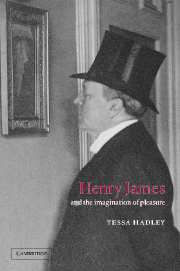Book contents
- Frontmatter
- Contents
- Acknowledgements
- Introduction
- 1 ‘Just you wait!’: reflections on the last chapters of The Portrait of a Lady
- 2 ‘As charming as a charming story’: governesses in What Maisie Knew and ‘The Turn of the Screw’
- 3 ‘The sacred terror’: The Awkward Age and James's men of the world
- 4 Blushing in the dark: language and sex in The Ambassadors
- 5 Poor girls with their rent to pay: class in ‘In the Cage’ and The Wings of the Dove
- 6 ‘A house of quiet’: privileges and pleasures in The Golden Bowl
- Notes
- Bibliography
- Index
5 - Poor girls with their rent to pay: class in ‘In the Cage’ and The Wings of the Dove
Published online by Cambridge University Press: 22 September 2009
- Frontmatter
- Contents
- Acknowledgements
- Introduction
- 1 ‘Just you wait!’: reflections on the last chapters of The Portrait of a Lady
- 2 ‘As charming as a charming story’: governesses in What Maisie Knew and ‘The Turn of the Screw’
- 3 ‘The sacred terror’: The Awkward Age and James's men of the world
- 4 Blushing in the dark: language and sex in The Ambassadors
- 5 Poor girls with their rent to pay: class in ‘In the Cage’ and The Wings of the Dove
- 6 ‘A house of quiet’: privileges and pleasures in The Golden Bowl
- Notes
- Bibliography
- Index
Summary
James, like Strether, finally allows himself to imagine pleasure unbound from a moralising framework. The challenge is to find an expression for how the liberated late-Jamesian imagination of pleasure interacts with James's ever-sharpening perceptions of social class. The great love affairs in the late novels take all their colour and flavour from the rich medium of the privileged lives of their protagonists: the lovely rooms, the brilliant displays of clothes and jewels, the long leisured hours to play in, the stimulating discipline of an exquisitely cultivated good taste. John Goode in his chapter on The Wings of the Dove in The Air of Reality describes eloquently a James not only succumbed to the seductions of privilege but actually offering the possession of vast wealth as an opportunity for a kind of transcendence: ‘James sets out to realize an unsentimental acceptance of the price of innocence by regranting money its mystery and its representativeness, by creating for the intellectual a relation to it which is not that of contract but of consent, as to a power greater than any this world by itself can show.’ James is ‘honest’ in finding in ‘the coffers of the millionaire … the root of innocence and the flower of imagination’.
It is true, and important, that the opportunities for pleasure afforded by the possession of great wealth are never fudged or sentimentalised in the late writing.
- Type
- Chapter
- Information
- Henry James and the Imagination of Pleasure , pp. 113 - 143Publisher: Cambridge University PressPrint publication year: 2002



